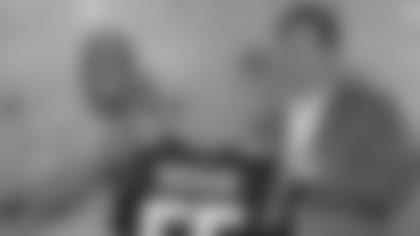CHARLOTTE — Bank of America Stadium is going to be full of Panthers legends this weekend, and one of the most productive is being honored as the Legend of the Game.
Defensive end Mike Rucker, who is third on the team's all-time sack list with 55.5, will be on hand to hit the Keep Pounding drum heading into the fourth quarter. That means a little extra to him, since he was standing on the practice field the day Sam Mills said those famous words for the first time, ahead of the 2003 playoff game against the Cowboys.
Rucker, a second-round pick in 1999, experienced the ups and downs in his first five years here.
At one point, he was the young guy in a room that included Reggie White, and he was among the players who survived the 1-15 season in 2001, to turn it around with a Super Bowl run two years later.
Playing alongside Hall of Famer Julius Peppers and a star-studded defense that included middle linebacker (and current general manager) Dan Morgan, Rucker went to the Pro Bowl in 2003 after posting a career-high 12.0 sacks.

Panthers.com caught up with Rucker this week to talk about what those early years of his career were like, and what it means to be back this weekend.
Q: When you're around the team these days, do you talk to current players about your experiences here, and what some of the teams you were on went through?
Rucker: "It's delicate, right? A lot of times when you're in the fire like that, everybody's got a solution. Everybody's telling you this and that, and the sky is falling. The one thing again about me in particular, I've been through 1-15, right? We won the first game of the year and each week we went thinking we're going to win, and we didn't. And there's a lot of learning from each individual. It's got to start with each individual, and they've got to say, OK, inside me, what do I want to get out of this?
"And I learned a lot. I learned that there were some guys that are just there to collect checks. I learned that there were some guys who don't necessarily love ball, but I'm here and I'll show up. And then there were some guys that had their pride on the line, that just could not accept getting on a plane or someone getting on a plane laughing and snickering about me as an individual. Like, you're not going to beat us by 60 and not go to the training room the next day because you're not sore, you didn't get work. And so I think it's that mentality that each individual's got to go into themselves and say, hey, what do I want to get out of this?
"So to answer your question, I haven't talked to any of the guys from that perspective, but being a guy that's been through that. It's not comfortable, but if you can embrace it, you can get something out of it. I always tell people, the 1-15 season is part of my story because that helped me develop into the person that I wanted to be, and two years later, I was leading the team in sacks and a Pro Bowl and helping the team to go to a Super Bowl. A lot of that DNA came from that 1-15 year for me, personally. And so I think that if you could put the right goggles on, you can learn a lot about yourself in times like those."

Q: When you think about that transition from the 1-15 team to the 2002 team with a new coaching staff and a lot of new players, what was that like in terms of the growth of what became a really good team?
Rucker: "When you talk about that year, we had new coaches, but again, it kind of started up top saying, 'hey, I want smart and tough,' and we're going to pick the guys because the film's not going to lie. So they picked some guys that were going to battle, which this team has those guys on there, and you just need more guys to make those plays, and not the silly stuff, right? So when we had Jack Del Rio as our defensive coordinator, he played the game, so you weren't, you weren't going to pull the wool over his eyes, right? So there was accountability, and I think that's something that I remember is that we laughed, we joked, we had fun, but we also held everybody accountable.
"And I think that was a catalyst, another positive building block from the basement of 1-15 to building this foundation. And then the next year, being in the dance because people believed, and they were drinking the Kool-Aid. And again, there was accountability from us as players, right? The accountability shouldn't start up top with your head coach; it should start with you as an individual to yourself, and an accountability to your teammate next to you. And then it should come from the coach and so forth.
"There are a lot of teams in the history of the NFL that the coaches barely did anything. The players policed it. And so when the players are policing it, you can call a spade a spade. Then the coach is just putting his little touches here and there, but it's got to start within.
"At the end of the day, if I go back to '02 and '03. It wasn't sexy. It wasn't flashy, but we ran the heck out of the ball, and you've got two really good dudes back there that can run the ball. So you just get simple, right? Like if we're not winning, we're going to smash-mouth. We're going to stop the run. We're going to run the ball, and we start there. I don't care if the ball is thrown in the air. I don't care if they throw the ball. We're going to stop the run, and we're going to run the ball. And I think that's a little bit of the '02, '03 time frame to try to help us establish, hey, it's physical. We're going back to old school."

Q: Speaking of that team, you had a linebacker on that team who is now a general manager. When you think of Dan Morgan as a player, what was it about him that kind of points to his ability to pick players, his ability to be a guy who can run a football operation?
Rucker: With D-Mo, I guess why we clicked so much, for me personally, was that he went to Miami, but he could have easily been in the Big 8 or the Big 12, where it was smash-mouth football. And our middle linebackers were going downhill, filling the gap on fullbacks, running after the option. So, for me, leaving college at Nebraska and going into the pros, that's what I saw in him, right? That's where my connection was, like this is my guy, we could have played college ball together. It wasn't pretty, like he plays smash-mouth football, and so for Dan, just seeing him during training camp, like that hasn't left. That's his DNA, it's physical, right? And the team is trying to adopt that identity of being physical on both sides of the ball.
"And you're cooking with ingredients, but you're also trying to add your own spices, and sometimes that takes time. But at the end of the day, being physical, it's hard to coach that, right? You got it or you don't. Either someone's going to stick their nose in there and try to pop that ball or they don't. And you can turn the film on and figure it out really quick.

"That's what attracted me to D-Mo, and as a player, I'm playing for my guy, that's my quarterback. I'm playing for him. When D-Mo brings the call in, that's my guy, right? And so him now taking that same mentality and building this team, that's what he wants, and you could see that, and he talks about that.
"He was my Luke Kuechly, right? Like he was Luke before Luke, where he's calling out plays, he's getting people lined up. Here's your real middle linebacker; bloody nose, jammed up finger, whatever. You have to drag him off the field to get him off. When I say D-Mo, that's why I get a smile when I say his name, because he was a true football player from start to finish, and unfortunately, it was a short career, but I'm just proud to be able to play with him for the time that I did because he was a true professional. He's a true football player. No doubt he'll get them right. That part I'm not worried about."

Q: As one of the players from that 2003 team that heard the original Keep Pounding speech, what does it mean to come back and hit the drum and share those stories, when a lot of younger players and fans weren't around for that originally?
Rucker: "I mean, just being a part of that, on a broader scale, it's like when people think about going back to a high school reunion or a college reunion, like a place that you have either left a mark or you partake in some type of celebration. For me to come back, the organization is so young that we've got the building blocks of the organization and the fan base. So to come back and you know, every inch of that place, you know where the seats are, you know if you go in that stadium right now, hey, I remember my family was sitting there and during this game, or I had a sack right there in that end of the field, or, we won that playoff game against the Cowboys right there. So you've got all these emotions that come flooding back.
"And first of all, it's a big honor, right? It's a big honor to come back home to the place where you have played so much with your fan base, and be able to hit the drum. And obviously, the drum has so much meaning in itself, but it's really an honor to be able to come back and hit the drum.

"It's special, and I think you brought up a good point. As organizations get bigger and people come and go, you get further and further away from the origin of the story. I mean, you can go into the history books, right? The only way history stays alive is if people tell the stories, right? Which gave me the thought that there should be, on entry to this organization, especially as a player, that story should be told, right?
"Like, Keep Pounding isn't just a word that you find in a dictionary. It means something that is our heartbeat, right? And that should be here, until we're all gone, right? It should be something that, as you come in, you get downloaded, hey, this is what Keep Pounding means. This is where this came from. No different than if you went to the school where Albert Einstein or somebody came from, you know the story that made that school special.
"And this is no different, and Sam Mills was special, so for myself in particular to be able to be around him as a coach was special. I got the other side. I didn't play with him, but I got to see the other side of him coaching and what he brought to the table, especially when he's looking life and death face-to-face. And we got to walk the walk with him a little bit during that time. It's very special. I honor that. I don't take that lightly.
"And so that's why I like hitting this drum and why it's so important to keep telling the Keep Pounding story to each generation, so 50, 60, 100 years from now, Keep Pounding will always be a part of this organization and people will still know about it."















